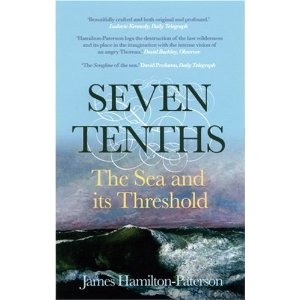Seven Tenths: The Sea and Its Thresholds – James Hamilton-Paterson
My parents gave me this book when I was fifteen (it was published in 1993) at the end of a school year, and I reread it recently because it’s essentially been on my mind for the last eighteen years (there, you know how old I am).
This is the book about the sea I’d lend to people who don’t necessarily feel as connected to it as I do. I’d also lend it to people who love literature, poetry, and philosophical musings. I’d lend it to my sister, perhaps (if she enjoyed non-fiction), because she loves words, and James Hamilton-Paterson clearly does, too.
This is a collection of essays about the ocean, loosely tied together with a lyrical description – chapter by chapter – of a swimmer on a coral reef who is lost at sea, alone. Paterson writes beautifully, and the value of the book is more in his manner of writing and the reflections he provokes than in the facts and figures presented.
There’s an account of a trip he did on a survey ship that was mapping part of the USA’s ocean floor territory, a chapter about a tiny island in the Phillipines – on which he once spent some time, alone – being converted into a resort for Japanese businessmen, and a chapter on shipwrecks. He characterises wrecks as either time capsules, time bombs, gold mines or tombs. I liked that set of categories. Of course a wreck may inhabit more than one of those labels.
The history of ocean mapping and exploration – including William Beebe and Robert Ballard – is touched on, and there’s a wonderful chapter on coral which is more concerned with Paterson’s (and our) experiences of reefs than with being a scientific treatise on marine life. At one point Paterson describes taking a cassette player wrapped in plastic bags down several metres onto the reef, and playing classical music to the fish. The only ones who reacted were apparently the fiercely territorial damsel fish, who nipped at the plastic coverings.
There is a chapter on fishing, too, which is vivid. Paterson describes the process and results of dragging huge nets through the ocean, both on a detailed personal level – what he saw in the nets, how it sounded and smelled, and so on – and on a more macroscopic plane, explaining the consequences of wasteful bycatch and overfishing, and outlining the limits of our knowledge on the subject.
Paterson doesn’t like scuba – he feels constricted, and that the noise in his ears of his breathing is too loud. It prevents him from hearing, feeling and seeing what he wishes to in the ocean. I think he’d make a good free diver, since all is quiet when you’re doing that.
The book is available here.



[…] a bit with this book. James Hamilton-Paterson has a highly literary style, which I enjoyed in Seven Tenths. In this book, however, he has a more well-defined topic: a joint British/Russian expedition to […]
By: Bookshelf: Three Miles Down « Learn to Dive Today on 10 August 2011
at 0730
[…] James Hamilton-Patterson points out in his review of the book, Momsen is lionised by Maas to a degree […]
By: Bookshelf: The Terrible Hours « Learn to Dive Today on 30 November 2011
at 0651